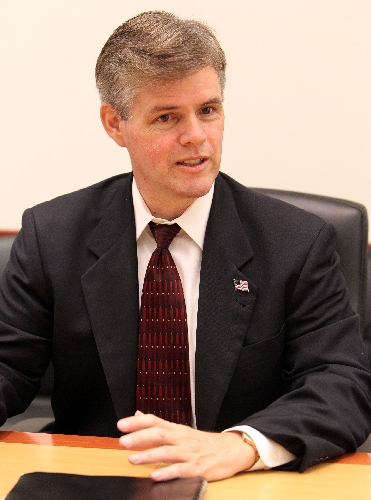Edwards challenges Titus to three debates in congressional race
Republican congressional candidate Chris Edwards on Tuesday said he is challenging his Democratic opponent, former U.S. Rep. Dina Titus, to three debates, hoping to raise his profile for his long-shot campaign.
"I think the people of the district deserve to hear us," Edwards said during an interview with the Las Vegas Review-Journal editorial board. "She needs to earn their vote."
Edwards said he already has accepted a proposed October debate sponsored by KSNV-TV, Channel 3.
The Titus campaign said she is considering the invitation from Channel 3 but has made no commitment and won't anytime soon.
"I'm sure he would love to have a debate every week," said Jay Gertsema, Titus' campaign manager. "Candidates that are in tough positions and lack name ID love the exposure they get by having debates."
In 2010, Titus debated her Republican opponent, Joe Heck, several times in the run-up to the election, which she barely lost. The two candidates were closely matched in the swing 3rd Congressional District. They met face to face in at least five forums, and three were considered full-on debates.
This year, Titus is running in the safe Democratic 1st Congressional District to replace U.S. Rep. Shelley Berkley, D-Nev., who is running for the Senate against U.S. Sen. Dean Heller, R-Nev.
In the 1st Congressional District around urban Las Vegas, registered Democrats outnumbered Republicans by a two-to-one margin, or 51.5 percent to 26.3 percent, as of the end of June. Titus, a former Nevada senator for two decades, also is far better known and funded than her GOP opponent so she can afford to snub him.
The financial comparison of the two candidates could not be more stark.
Edwards, running for the first time, has raised $4,601 in contributions while lending himself $142,000 for his race, according to his latest finance report to the Federal Election Commission.
Titus has raised $861,626, and has $369,062 available to spend. Her campaign is debt-free. She has raised more than $375,000 from political action committees, a sign interest groups think she will return to Congress.
Democratic Party leaders are so confident Titus will prevail in the Nov. 6 election that they have enlisted her to help other Democratic candidates raise money for tougher House races across the country.
Edwards said he is convinced he still has a fighting chance to win the district despite overwhelming odds because nonpartisan voters - 17 percent of the district - may side with him over the dismal economy. He blames Democratic policies that Titus has backed, policies that he contends have expanded government under President Barack Obama.
Edwards said a majority of Nevadans remain unhappy with Obama's signature health care law, which will require them to buy health insurance. Titus voted for the law and continues to support it.
"She overwhelmingly voted against the will of the people," Edwards said.
Edwards also argued that Titus didn't deliver enough of the $787 billion stimulus to Nevada - a measure he said he would not have voted for in 2009. Nevada got nearly $2 billion of the stimulus pie, which Democrats said created 6,000 jobs and saved thousands more, particularly teachers and other public servants.
"I would have gone after it," Edwards said of the stimulus, explaining that when federal money is made available states should take it.
Titus didn't do enough "when it came time to bring the pork home," he said.
Edwards said he is trying to make inroads with Hispanics, although Latino voters tend to favor Democrats.
He contends some Latinos remain upset that Titus caused state Sen. Ruben Kihuen, a rising Hispanic figure in the Democratic Party, to drop out of the race after polls showed she would easily defeat him in the primary.
The Titus campaign dismissed any hard feelings, noting that Kihuen has endorsed her for Congress.
Edwards, a naval officer who served 25 years in the military, said if he were elected, he would work to shrink the federal government and cut the budget, including defense spending.
He said he served overseas on several bases in Europe that should have been closed long ago after the 1990s U.S. military drawdown of forces there. He said one base in Italy for the Navy's 6th Fleet remains open, although there are no ships left in the fleet.
"You can downsize the military in a smart fashion," Edwards said.
Asked whether the military could survive major reductions, such as a possible automatic $500 billion in cuts that would happen over 10 years unless Congress reaches a budget deal, Edwards said it's possible.
"If they do it smartly, they can live with it," he said of the Pentagon.
Edwards said the military often pays top dollar for everything from apartments to goods and services because there is little effort to save money.
He said the military once paid $2,800 a month for a two-bedroom apartment for him in Europe, and when he later rented it as a civilian, he got a reduction to $1,300 just by asking.
"We don't negotiate very well," Edwards said of the government.
Stephens Media Capital Bureau Chief Steve Tetreault contributed to this report. Contact Laura Myers at lmyers@reviewjournal.com or 702-387-2919. Follow @lmyerslvrj on Twitter.

















